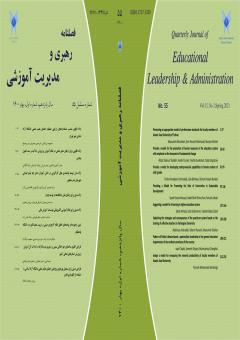A study of hope and life satisfaction based on Islamic lifestyle among kindergarten teachers in Shiraz
Subject Areas :Zahra Ardebili 1 , Morteza Keshavarz 2 *
1 - Psychology student, Department of Psychology, Arsanjan Branch, Islamic Azad University, Arsanjan, Iran.
2 - Assistant Professor, Department of Islamic Studies, Arsanjan Branch, Islamic Azad University, Arsanjan, Iran.
Keywords: Life expectancy, life satisfaction, Islamic lifestyle, Kindergarten teachers. ,
Abstract :
Purpose: The variables of life expectancy and life satisfaction are closely related to lifestyle. Life expectancy is a combination of multidimensional components that are cognitive and focused on the future.Therefore, the importance of examining this issue for kindergarten teachers who play an important role in shaping the personality of individuals in society is doubled. Therefore, The aim of this study is to explore the possible relationship between Islamic lifestyle, life satisfaction, and life expectancy.
Method: In line with this goal, a sample of 70 people from a population of 600 kindergarten teachers in Shiraz was used, and two relationships were estimated using statistical regression, including the effect of the Islamic lifestyle on life satisfaction and the effect of the Islamic lifestyle on life expectancy.
Results: According to the results, a linear relationship between the Islamic lifestyle variable and life satisfaction was confirmed, but a linear relationship between the Islamic lifestyle and life expectancy was not confirmed, but a nonlinear relationship between the Islamic lifestyle variable and life satisfaction and between the Islamic lifestyle and life expectancy was confirmed.
Conclusion: According to the results, it is suggested that the authorities increase their hope and satisfaction with life by organizing a training workshop on the topic of "Islamic lifestyle education" for premarital couples.
افشانی، سید علیرضا؛ رسولی نژاد، سید پوریا؛ کاویانی، محمد و سمیعی، حمیدرضا.(1393). بررسی رابطه سبک زندگی اسلامی و اجتماعی مردم شهریزد. دو فصلنامه مطالعات اسلامی و روانشناسی، 8(14): 83-103.
آل یاسین، زهرا. (۱۳۹۵). مقایسه مثبت نگری، امید به زندگی و رضایت از زندگی بین دانش-آموزان دختر تک فرزندی و چند فرزندی. کنفرانس جهانی روانشناسی و علوم تربیتی، حقوق و علوم اجتماعی در آغاز هزاره سوم.
بذرافشان مرتضی، سامانی سحر. (۱۳۹۸). عوامل موثر بر توسعه گردشگری کشاورزی مورد مطالعه: شهرستان جهرم. مطالعات مدیریت گردشگری. ۱۴(۴۷): ۲۲۰-۱۹۳.
بلقیس و رشیدی، داریوش و حسام آبادی، کریم و اسدی نسب، حجت اله. (۱۳۹۳). بررسی رابطه آموزش ضمن خدمت با تعهد سازمانی در شرکت بهره برداری نفت و گاز مارون اهواز، دومین همایش ملی پژوهش های کاربردی در علوم مدیریت و حسابداری، تهران.
پورسردار. نوراله پورسردار، فیضاله، پناهنده، عباس، سنگری، علیاکبر و عبدیزرین، سهراب (1392). تأثیر خوشبینی (تفکر مثبت) بر سلامت روانی و رضایت از زندگی: یک مدل روانشناختی از بهزیستی. مجله حکیم، 15(1): 32-49.
تاج آبادی، رضا و شعبانی، سمیه. (۱۳۹۹). بررسی جایگاه امیرکبیر در مبارزه با انحرافات فرقه بابیت و بهائیت. رهیافت فرهنگ دینی، ۳(۹): ۱۹-۱۳.
ذوالفقاری، شادی و دلاور، علی و برجعلی، احمد. (۱۳۹۷). بررسی عوامل اجتماعی موثر بر وقوع طلاق به شیوه فراتحلیل، هفتمین همایش علمی پژوهشی علوم تربیتی و روانشناسی، آسیب-های اجتماعی و فرهنگی ایران، تهران.
زارع برزشی، سیمین؛ ثمری، علی اکبر و رستگار، داود. (1393). بررسی رابطه باورهای مذهبی با رضایت از زندگی و امید به زندگی معلولان جسمی حرکتی شهرستان مشهد. دومین همایش ملی پژوهش و درمان در روانشناسی بالینی.
طهماسبی، سمیه.، جعفری، الهام. (۱۳۹۵). اثربخشی مثبت اندیشی بر افزایش عزت نفس و رضایت از زندگی، دومین کنفرانس ملی و اولین کنفرانس بین المللی پژوهش¬های نوین در علوم انسانی.
فرگوسن، ج؛ و تاکانه، ی. (1989). تحلیل آماری در روان¬شناسی و علوم تربیتی. ترجمه علی دلاور و سیامک نقش بندی.۱۴۰۱. تهران: نشر ارسباران.
کرمی، ایرج و حاج علی اکبری، فیروزه. (۱۳۹۳). شناسایی و رتبه بندی ابزارهای تامین مالی بانک در عرصه تجارت بین الملل با استفاده از روش های ahp-topsis، مطالعه موردی: شعب ارزی بانک ملی ایران شهر تهران)، کنفرانس بین المللی مدیریت و مهندسی صنایع، تهران.
کاویانی، محمد. (۱۳۹۲). سبک زندگی اسلامی و ابزار سنجش آن، چاپ سوم. قم، پژوهشگاه حوزه و دانشگاه.
گلکاری، هادی و پورشافعی، سمیه. (1397). نقش پیشبینی امید به زندگی در رضایت از زندگی زناشویی زنان شهر بیرجند، مطالعات فرهنگی - اجتماعی خراسان،13(2): 153-157.
Abbasi H, Karimi B, Jafari D. (2017). The effectiveness of education based on acceptance and commitment on tolerance of failure and ineffective attitudes of mothers of students with mental disabilities. Psychological Quarterly of Exceptional People. 6 (429):81-108
Elliott, R., & Macdonald, J. (2021). Relational dialogue in emotion‐focused therapy. Journal of Clinical Psychology, 77(2): 414–428.
Diener, E. D., Emmons, R. A., Larsen, R. J., & Griffin, S. (1985). The satisfaction with life scale. Journal of Personality Assessment, 49(1): 71-75.
jafarizadeh F, hojati H. The Effect of Qur'anic Stories on Preschoolers' Self-esteem During 2015-2016. IJNR 2017; 12 (3): 1-6.
Farhush M, Radmard H, MirMuhammadian SM, Palangi Z. (2018). The mediational role of family endurance in the relation of islamic lifestyle to the satisfaction with life. Journal of Lifestyle. 3(2):79-97.
Kline, R. B. (2010). Promise and pitfalls of structural equation modeling in gifted research. In B. Thompson & R. F. Subotnik (Eds.) , Methodologies for conducting research on giftedness, 13(4): 147-169.
Miller, J. F., & Powers, M. J. (1988). Development of an instrument to measure hope. Nursing Research, 37(1): 6-10.
McLaurin-Jiang S, Hannon EA, Seashore C, Orr CJ, Ritter V, Flower KB. (2019). Recent trends in infant car seat tolerance screening failure within a large health care system, 2014–2018. Hospital Pediatrics. 9(10):813-7.
Uddin, Faheem, Irshad, Erum. (2022). Sufism, religiosity, life satisfaction, hope and optimism: a comparative study of the disciples and non-disciples, international journal of psychological and behavioural research (ijpbr), 2(1): 314-319.

